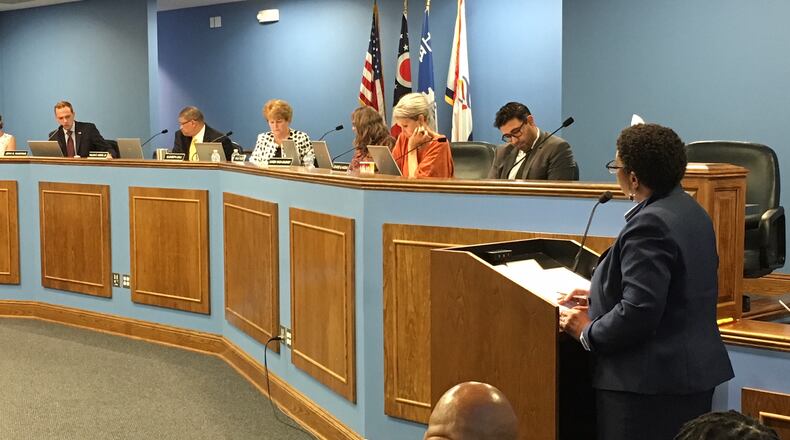Lehner said late Wednesday night that her bill to change the state takeover process is “totally different” from the House’s version, meaning the issue is unlikely to be resolved quickly.
“I hope we can start to share (bill details) by early next week,” Lehner said. “We’re still working out a lot of challenges.”
RELATED: Dayton school board demands that leaders attack key issues
House Bill 154 would repeal existing state takeover law and dissolve the three Academic Distress Commissions that are currently running the Youngstown, Lorain and East Cleveland districts, returning control to those local school boards.
The new law would require that district school boards establish an improvement team for any school that receives an overall “F” on the state report card, starting in summer 2020. The team would be required to “conduct a performance audit, develop and finalize and improvement plan, and submit the plan to the district board for its approval,” according to Ohio’s Legislative Service Commission.
But the district wouldn’t have to begin implementing that plan unless a school gets a second overall “F,” and the amended bill does not mandate “community learning center” supports that were required in the original document, making them an option instead, according to the LSC.
MARCH: State leaders rip school takeover law
The state representatives who spoke in favor of the bill Wednesday largely talked about the failures of Ohio’s existing takeover model. Republican Rep. Don Jones, a co-sponsor, said the bill would restore local control that the current model stripped away, affecting community engagement and morale.
“We need to do what is right by our students,” Jones said. “The current model of state control is not working and shows no signs of being able to work.”
The bill passed the House 83-12. Two who voted against it were local state representatives Todd Smith, whose district includes a small part of Dayton Public Schools, and Niraj Antani.
Smith said in schools that are “failing their students,” the problem is usually not schools or teachers but “the quality of students … hungry kids, kids who have had no investment in their education and growth.” He argued that fixing those problems via social services in schools would be “terribly expensive.”
FEBRUARY: Key state legislator says tweaks likely for takeover law
Smith also called the new plan “all carrot and no stick,” arguing that the current threat of takeover can inspire schools to improve their performance. He argued that Trotwood Superintendent Tyrone Olverson’s urgent staff overhaul was tied to that district narrowly avoiding takeover. But those moves didn’t happen until the testing that decided Trotwood’s takeover fate was over.
Antani said he believes in reforming the Academic Distress Commission model, but thinks HB 154 is the wrong way.
“This bill completely guts any accountability for failing schools,” he said. “Dayton Public Schools is under threat of being put in an Academic Distress Commission, and they need our support, but also accountability to turn the school district around. … This bill will result in failing schools continuing to graduate students who can’t read, write, or do math.”
State Rep. Joe Miller, the bill’s other sponsor, acknowledged that HB 154 had no guarantee of solving decades-long problems at the lowest-performing schools. But he said putting the focus at the school level is important, as an urban school may have different options than a rural one, and things that work at a high school might not work at a middle school.
2018 STORY: Dayton schools subject to takeover earlier than district thought
About the Author

